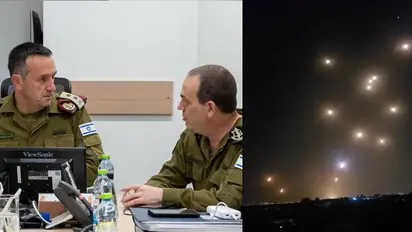'Will have consequences': Israel threatens retaliation after Iran launches 200 missiles in escalating conflict

Synopsis
Tensions in the Middle East escalated sharply on Tuesday as Israel threatened retaliation against Iran following a significant missile attack that Israeli officials are describing as a "serious attack."
Tensions in the Middle East escalated sharply on Tuesday as Israel threatened retaliation against Iran following a significant missile attack that Israeli officials are describing as a "serious attack." The Israel Defense Forces (IDF) confirmed that nearly 200 missiles were launched by Iran, heightening fears of a broader conflict in the region.
Speaking on national television, Daniel Hagari, the spokesperson for the IDF, addressed the nation, pledging that the missile strike "will have consequences." Hagari emphasized that Israel is maintaining a state of high alert in response to the aggression, underscoring the gravity of the situation.
"We are on heightened alert on defense and offensive, we will protect the citizens of Israel. This [missile] fire will have consequences. We have plans, and we will act in the time and place that we choose," he said.
With reports of missiles passing over parts of Jordan and targeting Israeli territory, the atmosphere across Israel remains extremely tense, particularly in major cities like Tel Aviv and Jerusalem.
The attack comes just after 8:30 p.m. local time, with reports of air-raid sirens and explosions being heard throughout the country. However, according to the IDF, there have been no confirmed injuries or significant damage reported on the ground, though the military remains vigilant for further threats.
The missile barrage, launched by Iran’s Islamic Revolutionary Guard Corps (IRGC), is being framed as retaliation for Israel's recent military actions targeting Iranian proxies in the region. Tehran has claimed the strikes were in direct response to the killing of key leaders from Hezbollah and Hamas by Israeli forces in recent weeks.
Specifically, the missile attack was described as retribution for the killing of Hezbollah leader Hassan Nasrallah, who was reportedly killed in Lebanon last week, as well as Hamas leader Ismail Haniyeh, who was killed in Tehran in July.
Iran’s supreme leader, Ayatollah Ali Khamenei, reportedly gave the order for the missile launches, indicating the regime’s willingness to escalate its confrontation with Israel.
Following the missile barrage, the Israeli military issued a nationwide alert, advising citizens to take shelter in protected spaces. However, just over an hour after the attack, the IDF informed residents that they were permitted to leave these spaces, signaling that the immediate threat may have subsided.
Meanwhile, Iran’s mission to the United Nations defended the missile attack, claiming it was a legitimate response to "terrorist acts" carried out by Israel. The Iranian government highlighted recent Israeli military operations against Hezbollah in Lebanon as a primary justification for the missile strikes.
A post on X (formerly Twitter) from the Iranian mission warned that any further response from Israel would result in a "subsequent and crushing response," indicating that the missile launches might not be the last word in this conflict. Tehran appears prepared for an escalation should Israel retaliate in the coming hours or days.
The missile exchange between Iran and Israel marks a significant flashpoint in the region, particularly with Iran signaling its willingness to respond aggressively to any Israeli military actions. The strike follows nearly a year of ongoing conflict between Israel and Hamas, with Israel also ramping up its offensive against Hezbollah in Lebanon in recent weeks.
Check the Breaking News Today and Latest News from across India and around the world. Stay updated with the latest World News and global developments from politics to economy and current affairs. Get in-depth coverage of China News, Europe News, Pakistan News, and South Asia News, along with top headlines from the UK and US. Follow expert analysis, international trends, and breaking updates from around the globe. Download the Asianet News Official App from the Android Play Store and iPhone App Store for accurate and timely news updates anytime, anywhere.